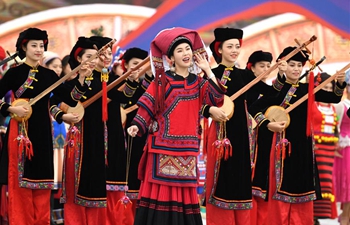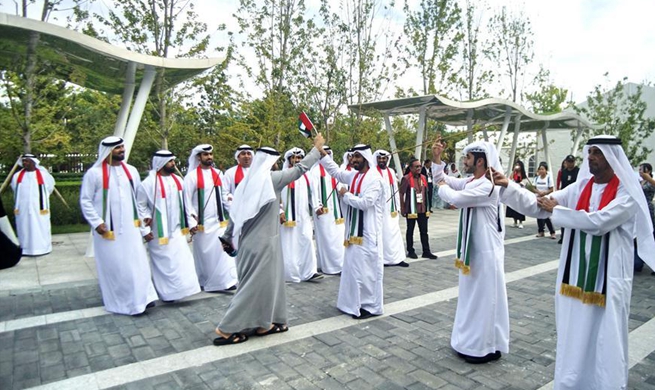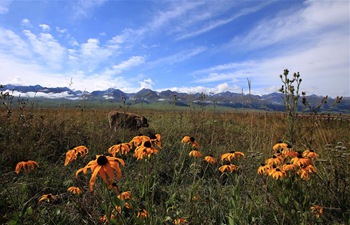HOSAENA, Ethiopia, Sept. 13 (Xinhua) -- Bekelechi Belachew in Ethiopia's Hadya Zone recalled the struggle she endured for defying Ethiopia's centuries-old male-dominated agrarian livelihood with a bold decision to harvest her family's farmland.
It all began when Bekelechi's aging father, who was the only male member of the family, struggled to harvest the farmland, on which his extended family depended for a living.
The unfortunate reality was then exacerbated due to the family's financial inability to hire a laborer to help with the farmland, which left the household in limbo over their uncertain future.
Albeit the long-standing tradition that excludes women from agricultural activities, young Bekelechi then decided to till her family's plot, igniting an uproar from majority community members -- as she was eventually discarded by her community, including those close family and relatives.
"Let alone other members of our community, even my father was upset when I started tilling the farmland," Bekelechi told Xinhua in a recent interview, as she recalled the magnitude of hue and cry she received from members of the hilly forested town in southern Ethiopia.
Bekelechi's enduring endeavor that began when she decided to cultivate her parents' farmland against the odds also continued after she embarked on a new life as a married woman -- as she still refused to abandon her land even when her husband, a teacher in profession, relocated to a nearby town.
After years of struggle and social neglect, Bekelechi is now considered as a role model among members of her community, with unrelenting praise flooding from family relatives, local government officials as well as experts in the agriculture sector.
Bekelechi's backyard, where she has been exerting mix of various innovative water and land conservation approaches, now serves as a practical learning site among agricultural experts as they search for handy ways of teaching community members.
As part of her commitment to transform the East African country's centuries-old male-dominated agrarian livelihood, she is now leading a group of 200 fellow women in her small vicinity as they aspire to follow Bekelechi's leading role.
Albeit the public discontent that Bekelechi had to prevail during her early days as a pioneer women farmer, her commendable progress has also helped her to become a host of various supports from governmental and non-governmental organizations, which she dubbed "vital" in transforming her farmland and the eventual increase in agricultural outputs.
"I have been committed in my engagements towards achieving the most out of this small ranch," said Bekelechi, as she led a team of agricultural experts and journalists for a tour in her farm located just back of her house.
"Despite my efforts, this couldn't be achieved if I hadn't received the trainings and other forms of support from the Africa RISING," she stressed.
The Africa RISING program, which stands for "Africa Research in Sustainable Intensification for the Next Generation," has been providing various forms of support to Ethiopian farmers across the country, such as Bekelechi, as it advocates sustainable intensification of mixed-crop-livestock systems towards better food security, improved livelihoods and a healthy environment.
Despite the laudable achievements that are vivid across project implementation areas towards the transformation of depilated farmlands into an oasis of a well-protected environment, Ethiopian farmers who are unaware of such innovative climate-friendly approaches are often witnessed struggling due to lack of knowledge on water-conservation and land management.
Bekelechi and fellow other farmers who were fortunate enough with the support they obtained in effectively utilizing their farmlands, now urge for the scaling up of the project in a bid to address millions of farmers who are still enduring from lack of awareness and resources.
"Our commitment and the efforts we exert are really important towards our success," said Tefera Anito, another beneficiary of the Africa RISING program in Lemo district of Hadya zone.
The program, among other things, envisages better livestock, land and water conservation approaches with support from CGIAR Research Program on Water, Land and Ecosystems, and direct intervention of organizations such as the International Center for Tropical Agriculture (CIAT), the International Water Management Institute, the International Livestock Research Institute, CCAFS, as well as the Inter Aid.
Agricultural experts also echoed Bekelechi and Tefera's call, emphasizing the crucial significance of scaling up such initiatives in a national level towards improved livelihoods and healthy environment.
Water, land and ecosystems conservation scientists at CIAT, Meron Tadesse, stressed that large scale conservation-focused interventions, in addition to enhancing farmers' capabilities and promoting healthy environment, would be an ideal solution towards improving the East African country's food security status.
Noting that concerted efforts are currently underway in a bid to further scale up similar conservation activities, the expert also urged all concerned governmental and non-governmental organizations to join hands in promoting similar initiatives in a national level.













